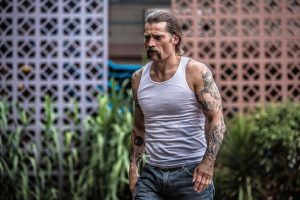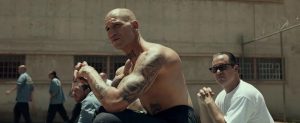
The film stands out for its stark realism, presenting prison as a brutal, unforgiving place where survival depends on power and alliances. Shot Caller is an intense exploration of how a seemingly ordinary person can be corrupted by the system, leading to a dramatic and irreversible transformation. The narrative shifts between two timelines: one focusing on Jacob’s gradual descent into criminality during his time in prison, and the other on his life after release, where he is forced to orchestrate a dangerous arms deal while trying to protect his family from the dangerous world he’s been pulled into.
Nikolaj Coster-Waldau delivers a powerful performance as Jacob, perfectly capturing his character’s emotional and psychological journey. He portrays the struggle of a man who sacrifices his morals and humanity to adapt to a violent new reality. His transformation from a mild-mannered, successful man into a cold-blooded gang leader is both believable and heartbreaking.
The film’s supporting cast, which includes Omari Hardwick, Jon Bernthal, and Lake Bell, also provides strong performances. Bernthal stands out as Frank “Shotgun,” a fellow gang member and prison enforcer, whose presence amplifies the tension and stakes.
What makes Shot Caller gripping is its exploration of how quickly life can spiral out of control. It highlights the thin line between moral choices and survival instincts, and how the prison environment forces people to make decisions that haunt them forever. The film doesn’t sugarcoat the consequences of crime and violence; rather, it portrays them with brutal honesty.
The cinematography and editing help build tension throughout, especially in the film’s prison scenes, which are grim and claustrophobic. These moments contrast with the cold, calculated moves Jacob makes in the outside world, showing how prison has transformed him into a person capable of great violence.
One of the film’s underlying themes is the cost of power and loyalty, as Jacob is forced to continually prove his worth to the gang at the expense of his personal life. His decisions are driven by a desire to protect his family, but the film asks difficult questions about whether the end justifies the means.
The pacing is deliberately slow at times, building suspense as the two timelines converge towards a violent and inevitable climax. The film ends on a somber and reflective note, leaving the audience with a sense of tragedy over how much Jacob has lost in the process of surviving his circumstances.
Overall, Shot Caller is an intense and emotionally charged crime drama that doesn’t shy away from showing the dark consequences of the prison system and gang violence. It is a compelling exploration of human survival, morality, and the extreme lengths people go to when pushed to their limits. For fans of gritty, realistic crime dramas, Shot Caller is a gripping and thought-provoking film that is sure to leave a lasting impression.
https://www.youtube.com/watch?v=CG1Vg2XU_1U&pp=ygUSU2hvdCBDYWxsZXIgKDIwMTcp















